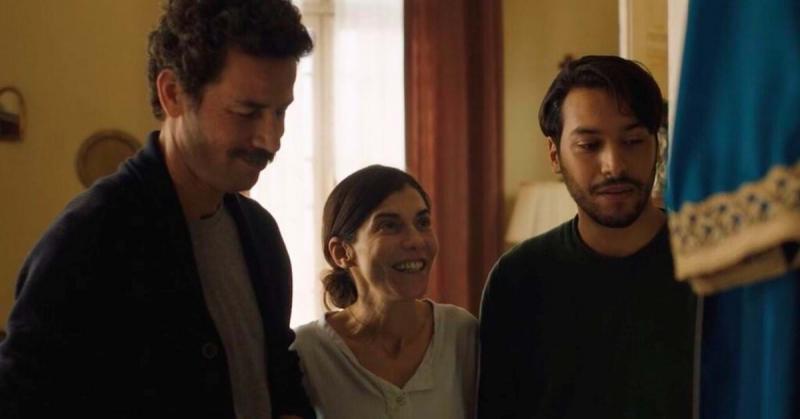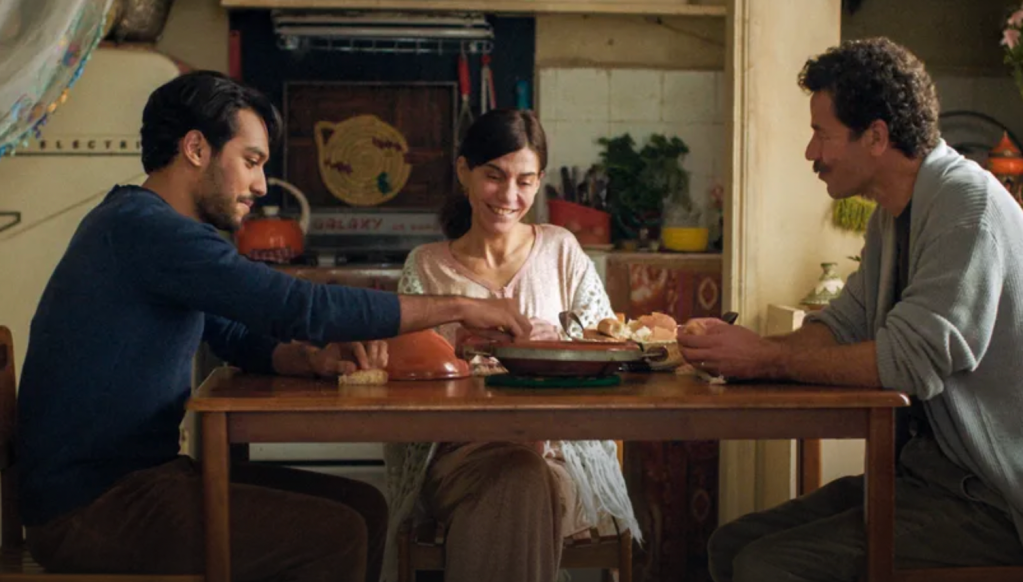The Blue Caftan review - unstitching repression in Morocco | reviews, news & interviews
The Blue Caftan review - unstitching repression in Morocco
The Blue Caftan review - unstitching repression in Morocco
A closeted tailor and his wife confront new realities in this exquisite drama

The eponymous garment in The Blue Caftan is a thing of beauty meticulously stitched and embroidered by Halim (Saleh Bakri), a maalem or master tailor, in one of Morocco’s oldest medinas. His craftmanship, with its focus on intricate details and on colour, is reflected in writer-director Maryam Touzani’s filmmaking, which is equally time-weighted and precise.
Like Daniel Day-Lewis’s dressmaker in Phantom Thread, Halim is an obsessive artist whose refusal to use a sewing machine infuriates customers at the shop he runs with his wife Mina (Lubna Azabal). The business is in trouble – and so is the marriage, owing to Halim’s closeted homosexuality.
Beauty is the couple’s stock-in-trade, and the film looks sumptuous, many different coloured rolls of satin giving it a metaphorical texture that evokes WB Yeats’s blue cloths of heaven “enwrought with golden and silver light”. Unfortunately, as in the poem, Halim’s dreams – in his case, of artisanal perfection – are being downtrodden.
He learned the maalem’s craft from his father but never had children with Mina so has nobody to whom he can pass on the tradition. In any case, bespoke tailoring is now a dying art. “No one can tell the difference between hand-made and machine-made any more,” a customer tells Mina, impatient at having to wait for Halim’s latest masterpiece. “It’s all over,” Mina tells her husband, and you feel she could almost be talking about the marriage as well as about the business. When Mina becomes unwell and Halim hires a young apprentice, Youssef (Ayoub Missioui), it seems as though an extra pair of hands might solve the problem. Yet the storyline develops unexpectedly with the presence of this handsome young man distracting Halim from his work at close quarters and sparking Mina’s jealousy. (Pictured above: Missioui, Azabal and Bakri)
When Mina becomes unwell and Halim hires a young apprentice, Youssef (Ayoub Missioui), it seems as though an extra pair of hands might solve the problem. Yet the storyline develops unexpectedly with the presence of this handsome young man distracting Halim from his work at close quarters and sparking Mina’s jealousy. (Pictured above: Missioui, Azabal and Bakri)
The Palestinian actor Bakri’s performance is wonderfully subtle. He somehow manages to convey with just a glance the intense, often repressed feelings of a gay man in Morocco where homosexuality is still illegal. In one scene at a local bathhouse, where he often goes for clandestine sex, all we see are the men’s feet beneath a cubicle door and yet the moment of joy is entirely captured. State repression is glimpsed in another scene, where Halim and Mina are stopped by a policeman on their way home from a café one night.
This is Touzani’s second film, following 2019’s Adam, and here, once again, she delves into her characters’ emotions in a way that is more understated, and therefore more complex, than anything the viewer might expect.
Azabal is a radiant presence throughout the film, somehow able to light up even the most heartbreaking scenes with an impish smile or, in the act of lovemaking, to disclose the sadness at the core of her marriage.
No less eloquent is the cinematography of Virginie Surdej, who works wonders with silent shots that often say a lot more than dialogue ever could. Her camerawork picks out the beauty in details and in the light that seeps into close-ups of fabrics and faces. The Blue Caftan is itself a thing of beauty, a deeply satisfying homage to craftsmanship and love.
more Film
 theartsdesk Q&A: Marco Bellocchio - the last maestro
Italian cinema's vigorous grand old man discusses Kidnapped, conversion, anarchy and faith in cinema
theartsdesk Q&A: Marco Bellocchio - the last maestro
Italian cinema's vigorous grand old man discusses Kidnapped, conversion, anarchy and faith in cinema
 I.S.S. review - sci-fi with a sting in the tail
The imperilled space station isn't the worst place to be
I.S.S. review - sci-fi with a sting in the tail
The imperilled space station isn't the worst place to be
 That They May Face The Rising Sun review - lyrical adaptation of John McGahern's novel
Pat Collins extracts the magic of country life in the west of Ireland in his third feature film
That They May Face The Rising Sun review - lyrical adaptation of John McGahern's novel
Pat Collins extracts the magic of country life in the west of Ireland in his third feature film
 Stephen review - a breathtakingly good first feature by a multi-media artist
Melanie Manchot's debut is strikingly intelligent and compelling
Stephen review - a breathtakingly good first feature by a multi-media artist
Melanie Manchot's debut is strikingly intelligent and compelling
 DVD/Blu-Ray: Priscilla
The disc extras smartly contextualise Sofia Coppola's eighth feature
DVD/Blu-Ray: Priscilla
The disc extras smartly contextualise Sofia Coppola's eighth feature
 Fantastic Machine review - photography's story from one camera to 45 billion
Love it or hate it, the photographic image has ensnared us all
Fantastic Machine review - photography's story from one camera to 45 billion
Love it or hate it, the photographic image has ensnared us all
 All You Need Is Death review - a future folk horror classic
Irish folkies seek a cursed ancient song in Paul Duane's impressive fiction debut
All You Need Is Death review - a future folk horror classic
Irish folkies seek a cursed ancient song in Paul Duane's impressive fiction debut
 If Only I Could Hibernate review - kids in grinding poverty in Ulaanbaatar
Mongolian director Zoljargal Purevdash's compelling debut
If Only I Could Hibernate review - kids in grinding poverty in Ulaanbaatar
Mongolian director Zoljargal Purevdash's compelling debut
 The Book of Clarence review - larky jaunt through biblical epic territory
LaKeith Stanfield is impressively watchable as the Messiah's near-neighbour
The Book of Clarence review - larky jaunt through biblical epic territory
LaKeith Stanfield is impressively watchable as the Messiah's near-neighbour
 Back to Black review - rock biopic with a loving but soft touch
Marisa Abela evokes the genius of Amy Winehouse, with a few warts minimised
Back to Black review - rock biopic with a loving but soft touch
Marisa Abela evokes the genius of Amy Winehouse, with a few warts minimised
 Civil War review - God help America
A horrifying State of the Union address from Alex Garland
Civil War review - God help America
A horrifying State of the Union address from Alex Garland
 The Teachers' Lounge - teacher-pupil relationships under the microscope
Thoughtful, painful meditation on status, crime, and power
The Teachers' Lounge - teacher-pupil relationships under the microscope
Thoughtful, painful meditation on status, crime, and power

Add comment